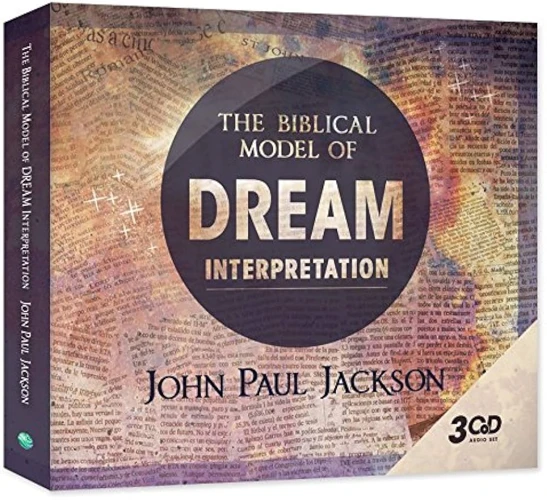Unlocking the hidden meanings of dreams has been a fascination for humans throughout history. In the Bible, dreams are regarded as a powerful form of spiritual communication. The Biblical Dream Book: Unlocking the Meanings of Your Dreams with Spiritual Guidance takes you on a journey to explore the significance of dreams from a biblical perspective. This step-by-step guide will delve into the dreams in both the Old and New Testaments, providing insights into their interpretations and symbolism. By connecting with divine guidance, understanding symbols, and exploring biblical themes, you will uncover the secrets hidden within your own dream world. Whether you encounter animals, water, numbers, or experience falling in your dreams, this article will provide techniques and tools for interpreting these common symbols. Through prayer, meditation, journaling, and seeking spiritual counsel, you can gain a deeper understanding of your dreams and apply the spiritual guidance they offer to your daily life. Embark on a transformative journey of personal growth, decision-making, and finding direction as you unlock the messages that your dreams hold.
Understanding Dreams in the Bible

Understanding dreams in the Bible is a fascinating journey into the realm of spiritual insight and divine communication. In the Old Testament, dreams often served as a means for God to communicate with individuals, offering guidance, warnings, and prophetic messages. For example, Joseph, the son of Jacob, interpreted dreams for both Pharaoh and his fellow prisoners, leading to favorable outcomes. In the New Testament, dreams continued to play a significant role, as seen in the angelic visitation to Joseph, the earthly father of Jesus, warning him to flee to Egypt to protect the child. The Bible teaches that dreams can hold deep symbolism and carry profound messages from God. By exploring the dreams found in the Bible, we can gain valuable insights into the meanings and significance of our own dreams in the present day.
1. Dreams in the Old Testament
– In the Old Testament, dreams played a significant role in divine communication. One notable example is Joseph, the son of Jacob, who had a dream where he saw his brothers bowing down to him. This dream foreshadowed Joseph’s rise to power and his eventual position as second-in-command to Pharaoh. Another famous dream in the Old Testament is the dream of the Pharaoh himself. He had dreams of seven fat cows being devoured by seven lean cows, and seven healthy ears of grain being consumed by seven thin and withered ears. Joseph interpreted these dreams as indicators of an upcoming seven-year period of abundance followed by a severe famine, leading Pharaoh to make wise preparations. These stories emphasize the importance of dreams as a means of receiving divine guidance and foresight in the Old Testament. To explore more about dreams in the Bible, you can read about the puppy dream, the dream of someone protecting me, or the biblical meaning of dreaming of poop for deeper insights into their interpretations and significance.
2. Dreams in the New Testament
In the New Testament, dreams continue to be a significant aspect of divine communication and guidance. One prominent example is the angelic visitation to Joseph, warning him in a dream to take Mary as his wife and not to fear. This dream provided Joseph with clarity and reassurance regarding the miraculous circumstances surrounding Mary’s pregnancy. Additionally, another important dream occurred when the Magi, who were seeking the newborn Jesus, were warned in a dream not to return to Herod and instead to go home by a different route. This dream protected the young child from Herod’s malicious intentions. The New Testament demonstrates that dreams serve as a means for God to convey vital messages and instructions to His people. They offer insight, direction, and protection, emphasizing the significance of dreams as a spiritual tool even in the present day.
Unlocking the Meanings of Your Dreams

Unlocking the meanings of your dreams involves connecting with divine guidance and delving into the symbols and themes they contain. By establishing a strong spiritual connection, you open yourself to receiving insights and messages from a higher power. Symbols in dreams hold great significance and can vary depending on cultural and personal associations. For example, animals can represent different qualities or characteristics based on their biblical significance. Water often symbolizes purification, renewal, or spiritual growth. Numbers in dreams can carry biblical connotations, such as the number 7 representing completion or perfection. Falling in dreams may indicate a sense of vulnerability or a need to surrender to a higher power. By understanding these symbols and themes within the biblical context, you can decipher the messages contained within your dreams and gain valuable insights into your spiritual journey.
1. Connecting with Divine Guidance
Connecting with divine guidance is a crucial step in unlocking the meanings of your dreams. To establish this connection, it is important to cultivate a relationship with the divine through prayer, meditation, and seeking spiritual counsel. Through prayer, you can ask for clarity, understanding, and guidance regarding the messages within your dreams. Meditation helps quiet the mind, allowing you to be more receptive to divine insights and revelations. Seeking spiritual counsel from trusted individuals or spiritual leaders can provide additional perspectives and interpretations that may enhance your understanding of your dreams. By actively engaging in these practices, you open yourself up to receiving spiritual guidance that can help unravel the mysteries of your dream world and provide valuable insights for your waking life.
2. Symbols and their Significance
Symbols are a crucial aspect of dream interpretation, carrying significant meaning and insights. In the realm of biblical dreams, symbols hold even greater importance, as they often have spiritual and prophetic implications. Understanding the significance of these symbols is key to unlocking the messages embedded within our dreams. Whether it’s animals, water, numbers, or falling, each symbol carries its own unique meaning in the biblical context. For example, animals may represent certain traits or characteristics, such as strength or cunning, while water often symbolizes purification, cleansing, or renewal. Numbers in dreams can have symbolic significance, such as the number seven representing perfection or completion. Falling can symbolize a loss of control or a need for humility. By familiarizing ourselves with these symbols and their biblical interpretations, we can gain a deeper understanding of the messages our dreams are conveying. It is important to approach dream interpretation with an open and discerning mind, seeking spiritual guidance to uncover the hidden treasures within our dreams.
3. Biblical Themes and Interpretations
Biblical themes and interpretations are fundamental aspects of understanding dreams from a spiritual perspective. Throughout the Bible, certain themes and motifs consistently appear in dream narratives, providing us with insights into their meanings. For example, dreams related to kingdoms and rulership often symbolize the divine authority and sovereignty of God. Dreams involving transformation and rebirth can signify personal growth and spiritual transformation. Additionally, dreams of guidance and direction highlight the importance of seeking divine counsel in decision-making. By studying these biblical themes and interpretations, we can gain a deeper understanding of our own dreams and the messages they convey from the divine realm.
Interpreting Common Dream Symbols

Interpreting common dream symbols allows us to decode the hidden messages within our dreams. Animals, for example, often carry symbolic meanings in dreams. A dream featuring a lion may symbolize strength, courage, or leadership, while a dream about a puppy could represent playfulness and loyalty. Water is another powerful symbol in dreams. It can signify emotional depth, purification, or even the divine presence. Dreams involving water can hold messages about our emotions, spirituality, or the need for healing. Numbers also carry significance in dream interpretation. For instance, the number three can represent wholeness, divine perfection, or the Holy Trinity. Meanwhile, falling in a dream may indicate a loss of control or a fear of failure. By understanding the symbolism behind these common dream symbols, we can unlock the deeper meanings and messages that our dreams are trying to communicate to us.
1. Animals
Animals are a common symbol in dreams and hold significant meanings within the biblical context. In the Bible, certain animals are associated with specific attributes and characteristics that offer insights into our dreams. For instance, a lion often symbolizes strength, courage, and leadership, while a lamb represents innocence and purity. Snakes, on the other hand, are associated with deception and temptation. By understanding the biblical symbolism of animals in dreams, we can decipher the messages they convey and gain deeper spiritual understanding. It’s important to note that the interpretation of animal symbolism can vary, so it is essential to consider the specific animal’s characteristics and its context within your dream.
2. Water
Water is a recurring symbol in dreams that holds significant spiritual meaning. In the Bible, water is often associated with purification, cleansing, and renewal. It can represent the Holy Spirit and the transformative power of God. Dreaming of water can symbolize a need for spiritual cleansing or a desire for emotional healing. It may also signify a season of change or transition in one’s life, as water is fluid and constantly moving. Additionally, water can represent the depths of the subconscious mind and the hidden emotions within. Understanding the symbolism of water in dreams can provide valuable insights into the spiritual and emotional aspects of one’s life, guiding towards growth and transformation. So, if you often dream of water, pay attention to the context and emotions associated with it, as it may hold a deeper message or guidance for your spiritual journey.
3. Numbers
Numbers hold significant symbolism and meaning in biblical dream interpretation. Throughout the Bible, various numbers carry spiritual significance and represent specific concepts. For example, the number seven represents completeness and perfection, as seen in the seven days of creation. The number three often symbolizes divine completeness, as seen in the Holy Trinity. Additionally, the number twelve signifies governance and spiritual authority, symbolized by the twelve tribes of Israel and the twelve apostles. When interpreting dreams with numbers, it is essential to consider their biblical meanings and the context in which they appear. Whether you encounter specific numbers in your dreams or notice patterns and repetition, understanding the symbolism of numbers can provide valuable insights into the messages your dreams are conveying.
4. Falling
In the realm of dreams, the symbol of falling is one that often evokes a sense of fear and unease. Falling in a dream can represent a loss of control, insecurity, or a fear of failure. However, in a biblical context, the meaning of falling can be interpreted differently. Falling can symbolize humility and surrendering to God’s will. It can serve as a reminder to rely on His strength rather than our own. The biblical story of Adam and Eve’s fall from grace in the Garden of Eden showcases the consequences of disobedience. However, falling in dreams can also signify the need for spiritual growth and a call to trust in God’s plan for our lives. By exploring the biblical references to falling and discerning the personal context of our dreams, we can gain deeper insights into our own challenges, fears, and spiritual development.
Techniques for Biblical Dream Interpretation

Techniques
Subscribe to Our Newsletter
Sign up to receive the latest news and updates.
1. Prayer and Meditation
Prayer and meditation are powerful techniques that can aid in the interpretation of biblical dreams. When faced with a dream that needs unraveling, taking the time to pray for guidance allows us to connect with the divine source of wisdom. By seeking God’s insight and understanding through prayer, we open ourselves up to receiving spiritual guidance and interpretations. In addition to prayer, meditation is another valuable tool. It helps us quiet our minds, focus our thoughts, and heighten our spiritual awareness. Through meditation, we can create a space for divine messages to flow, enabling us to receive clarity and deeper understanding regarding the meanings of our dreams. By incorporating prayer and meditation into our dream interpretation practice, we can tap into the spiritual realm and uncover the hidden truths within our dreams.
2. Journaling and Reflection
Journaling and reflection are powerful techniques for unlocking the meanings of your dreams. Keeping a dream journal allows you to capture the details and emotions of your dreams while they are still fresh in your mind. When you write down your dreams, you can identify recurring symbols, themes, and patterns, providing valuable insights for interpretation. Additionally, reflecting on your dreams can help you uncover deeper meanings and connections to your waking life. Write about your emotions and thoughts associated with the dream, and consider any potential messages or lessons that may be present. Taking the time to journal and reflect on your dreams will enable you to gain a greater understanding of the spiritual guidance they offer and facilitate personal growth and transformation.
3. Seeking Spiritual Counsel
Seeking spiritual counsel is an essential technique for biblical dream interpretation. When faced with perplexing dreams, it is beneficial to consult with individuals who have a strong understanding of biblical teachings and symbolism. Spiritual leaders, pastors, or mentors with knowledge in dream interpretation can provide valuable insights and guidance. They can help you navigate through the complexities of your dream, offer alternative perspectives, and provide biblical references that may shed light on its meaning. Engaging in open and honest discussions about your dream can lead to a deeper understanding and application of the spiritual guidance it offers.
Applying Spiritual Guidance to Your Life
Applying spiritual guidance to your life is a transformative process that can lead to personal growth, decision-making, and finding direction. By embracing the messages and symbolism within your dreams, you can gain valuable insights into your own psyche and receive divine guidance. Your dreams may reveal areas of your life where personal growth and transformation are needed. They can be a source of inspiration and motivation to overcome challenges and embrace positive change. Additionally, dreams can serve as a tool for making decisions and finding direction. Through prayer, meditation, journaling, and seeking spiritual counsel, you can tap into the wisdom and guidance offered by your dreams. Reflecting on the messages conveyed in your dreams can provide clarity and guidance in various aspects of life, such as relationships, career choices, and personal goals. Embrace the spiritual guidance bestowed upon you through the realm of dreams, and let it guide you towards a more fulfilling and purposeful life journey.
- Personal Growth and Transformation: Discover and embrace areas of personal growth and transformation through the messages and symbolism within your dreams.
- Making Decisions and Finding Direction: Use your dreams as a tool for making decisions and finding direction in various aspects of life, such as relationships, career choices, and personal goals.
1. Personal Growth and Transformation
Personal growth and transformation are powerful outcomes that can arise from understanding and applying the spiritual guidance found within our dreams. When we actively engage in interpreting and reflecting on our dreams, we open ourselves up to self-discovery and inner growth. By recognizing patterns, symbols, and themes in our dreams, we can gain insights into our subconscious desires, fears, and unresolved issues. This deep self-awareness allows us to make positive changes in our lives, develop healthier relationships, and overcome challenges. Dream interpretation serves as a tool for personal reflection, introspection, and healing, leading to a profound transformation of our mindset, emotions, and spiritual well-being. As we apply the lessons learned from our dreams, we embark on a journey of self-improvement and become more aligned with our true purpose and potential. Our dreams can serve as a guidepost on the path toward personal growth and transformation, as we actively integrate the wisdom of our dreams into our waking lives.
2. Making Decisions and Finding Direction
Making decisions and finding direction in life can often be challenging and uncertain. However, dreams can provide guidance and clarity in these situations. Just as Joseph in the Bible received divine direction through his dreams, we too can seek spiritual insight through our own dream experiences. Dreams have the potential to offer valuable perspectives and solutions to the dilemmas we face. They can reveal our deepest desires, fears, and aspirations, shedding light on the path we should take. By paying attention to recurring themes, symbols, and emotions in our dreams, we can gain a deeper understanding of ourselves and the choices we need to make. Through reflection, prayer, and seeking spiritual counsel, we can harness the wisdom within our dreams to navigate life’s challenges and find the direction we seek. Dreams can serve as a compass, guiding us towards the choices that align with our true purpose and bring fulfillment to our lives. So, embrace the power of your dreams and allow them to illuminate your path towards making decisions and finding direction in life.
Conclusion
In conclusion, the Biblical Dream Book: Unlocking the Meanings of Your Dreams with Spiritual Guidance offers a valuable framework for understanding and interpreting dreams through a biblical lens. By delving into the dreams mentioned in the Old and New Testaments, we can uncover timeless wisdom and guidance that can be applied to our own dream experiences. The process of connecting with divine guidance, understanding symbols, and exploring biblical themes allows us to unlock the hidden meanings within our dreams. Techniques such as prayer, meditation, journaling, and seeking spiritual counsel can further deepen our understanding and interpretation of our dreams. By applying the spiritual guidance gleaned from our dreams to our daily lives, we can experience personal growth, make well-informed decisions, and find direction on our spiritual journey. Embrace the transformative power of your dreams and discover the profound messages waiting to be unveiled.
Frequently Asked Questions
1. What is the purpose of dreams in the Bible?
In the Bible, dreams serve as a means of divine communication, allowing God to convey messages, guidance, warnings, and prophetic insights to individuals.
2. Are all dreams in the Bible prophetic in nature?
No, not all dreams in the Bible are prophetic. While some dreams carry prophetic significance, others serve as symbols or carry personal messages from God.
3. Can dreams in the Bible be interpreted universally?
Dream interpretations in the Bible can vary, as they often carry personal and cultural symbolism. However, certain symbols and themes can be interpreted universally based on biblical principles.
4. How can I discern if a dream is from God?
Discerning if a dream is from God requires seeking spiritual guidance and comparing the dream’s message with biblical teachings. God’s messages in dreams will align with His character and biblical truths.
5. What should I do if I have a troubling or confusing dream?
If you have a troubling or confusing dream, seek spiritual counsel, such as speaking with a pastor or mentor, who can help provide guidance and interpretation based on biblical principles.
6. Can dreams in the Bible have multiple interpretations?
Yes, dreams in the Bible can have multiple interpretations. It is important to consider the cultural and personal context of the dream as well as seek divine guidance for the most accurate interpretation.
7. Are there certain symbols that commonly appear in biblical dreams?
Yes, biblical dreams often include symbols such as animals, water, numbers, and falling, each carrying its own significance and meaning based on biblical interpretations.
8. Should I interpret my dreams solely based on biblical symbolism?
While biblical symbolism is a valuable resource, it is also essential to consider personal experiences, emotions, and circumstances when interpreting dreams. Balancing biblical symbolism with personal context provides a more comprehensive understanding.
9. Are there any biblical examples of dreams leading to personal transformation?
Yes, biblical examples such as Joseph, Daniel, and Peter demonstrate how dreams played a role in their personal transformations, guiding them to fulfill their purpose and destiny as ordained by God.
10. How can I apply the insights from biblical dream interpretation to my life?
Applying insights from biblical dream interpretation involves seeking spiritual guidance, prayer, journaling, and reflection. These practices allow for self-discovery, personal growth, and aligning one’s life with God’s purpose and direction.










